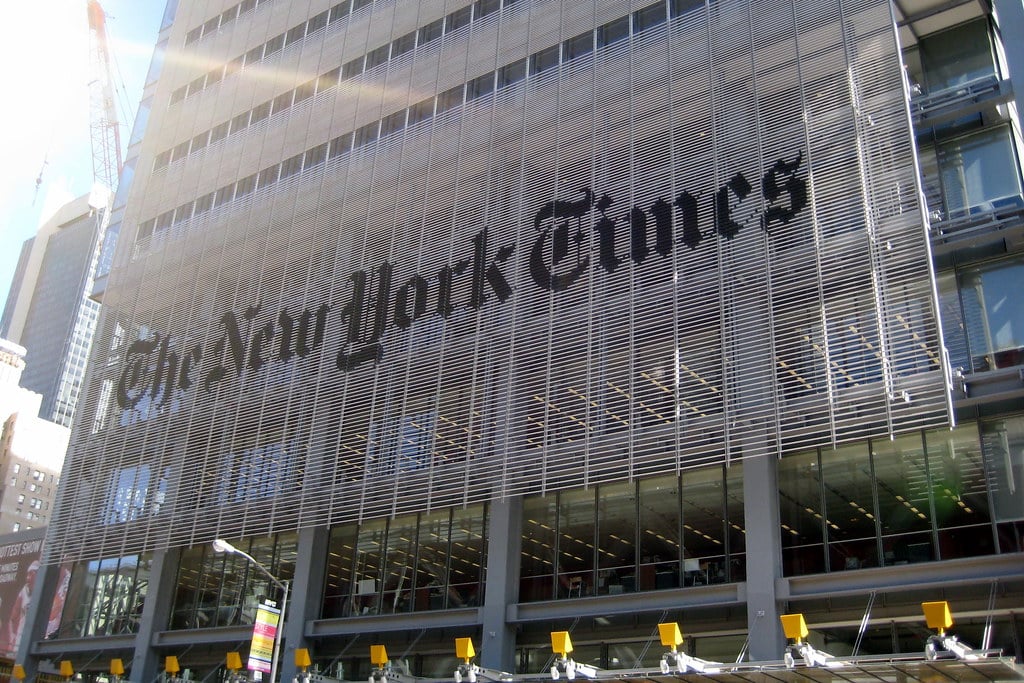The New York Times filed a major lawsuit on Wednesday accusing artificial intelligence giants OpenAI and Microsoft of brazenly copying millions of articles from the Times without permission to train their AI systems that now compete against the newspaper for audiences and ad dollars.
The sweeping copyright infringement complaint alleges that OpenAI and Microsoft scraped vast troves of Times journalistic pieces to power lucrative AI platforms like ChatGPT and Copilot that regurgitate news to users.
It asserts that the tech titans have built multibillion-dollar businesses by “free riding” on the Times’ investment in high-quality reporting while depriving the outlet of licensing fees.
The Times is seeking billions in compensation for damages and aims to force Microsoft (MSFT) and OpenAI to destroy any AI systems trained on its content. Legal experts say that the case poses a critical test to the matter of who controls and profits from AI technologies ingesting copyrighted material.
“If The Times and other news organizations cannot produce and protect their independent journalism, there will be a vacuum that no computer or artificial intelligence can fill” the complaint warns.
No Agreement Reached After Months of Talks
The Times said that it approached Microsoft and OpenAI in April after learning that its articles were feeding AI engines that were actively competing with the newspaper. It sought “fair compensation” for the use of its intellectual property and rules guarding against abusive AI practices.
However, negotiations failed to produce a licensing deal that both sides found acceptable. The Times now alleges that Microsoft and OpenAI have kept training algorithms on its content without the company’s consent and in violation of copyright law.
The paper asserts that the two tech companies have “no right to The Times’s content” and that their use of articles to power AI services that mimic news “is anything but fair” under legal doctrines permitting the uncompensated use of copyrighted works.
Millions of Articles Allegedly Scraped
The Times complaint provides copious examples of how Microsoft and OpenAI services regurgitate verbatim sections of Times reporting.
It estimates that “millions” of articles have been scraped without permission based on the scale of OpenAI’s web crawling campaign and Microsoft’s access to article archives. The Times blocked OpenAI bots from accessing new content earlier this year.
However, vast amounts of the Times’ journalistic pieces are already used to inform popular chatbots like ChatGPT, the Times alleges. It argues that OpenAI and Microsoft have crafted AI to rely heavily on the publication’s accurate news reports to boost reliability.
Billions in Damages Sought
The Times complaint says that Microsoft and OpenAI should pay billions in damages for systematically engaging in practices that should be considered copyright infringement.
If the Times is successful in its claims, it could set a world-changing precedent that would instantaneously put all large language models in danger of massive lawsuits.
OpenAI was recently valued at over $29 billion thanks to Microsoft’s multibillion-dollar investment. The software giant is integrating its chatbots across the tech giant’s products like its search engine Bing and Office 365.
The newspaper argues that the tech giants have built blockbuster businesses by misappropriating its premium journalism without compensation. It wants OpenAI and Microsoft to account for “billions of dollars in statutory and actual damages.”
Injunction Sought on Use of Articles
Beyond monetary damages, the Times wants a court order banning Microsoft and OpenAI from any further use of its articles to train its AI algorithms.
The paper seeks to enforce the destruction of any existing AI systems that unlawfully rely on its journalism. This could pose technical challenges. However, legal experts say that courts have tools like mandatory algorithm tweaks and independent audits to enforce injunctions on this type of infringement.
Critical Test of AI Copyright Issues
Intellectual property attorneys say the suit poses a landmark test to the implications of AI technologies in copyright laws given that the so-called large language models (LLMs) developed by the businesses ingest vast oceans of digitized material without payment.
The Times allegations underscore fears that AI threatens creative industries by repurposing their works to build for-profit platforms that undermine the original content that they produce.
Tech Industry Braces for Legal Fights
The Times’ bombshell lawsuit promises to accelerate the already fierce legal battles over AI dredging up copyrighted material across the internet, from news articles to song lyrics.
Entertainment groups and book authors have already sued AI creators over output echoing copyrighted dialogue, characters, and text. Multiple class-action lawsuits claim that AI firms like Microsoft and OpenAI have illegally copied a large number of written works into algorithms.
Legal experts expect a complex clash over applying existing copyright law to emerging generative AI capabilities as courts address a slew of thorny questions spanning from who owns the content, the fact that it is publicly available in most instances, and to which extent companies developing AI technologies can use it to feed their LLMs.
Battles Brewing Over Competing Interests
While tech firms argue mining the internet is fair game to train innovative AI benefiting the public, creative groups counter that copyright exists exactly to protect authors from uncompensated copying.
Complex legal debates are poised to occur over balancing free speech, copyright, and AI’s transformative applications. Policymakers are also starting to confront AI copyright dilemmas.
As seen with other groundbreaking technologies like cryptocurrencies and the blockchain, it may take years for regulators to have an appropriate grasp on the intricacies and dynamics that affect the development of AI technologies and its societal impacts.
The Times complaint not only emphasizes the importance of protecting independent journalism and news copyrights against infringement by AI competitors. It could be one of the most important lawsuits of the century if successful.
With trillion-dollar interests at stake around monetizing AI, the Times suit kicks off a landmark fight over who will control and profit from the automation of information flows and content creation.
